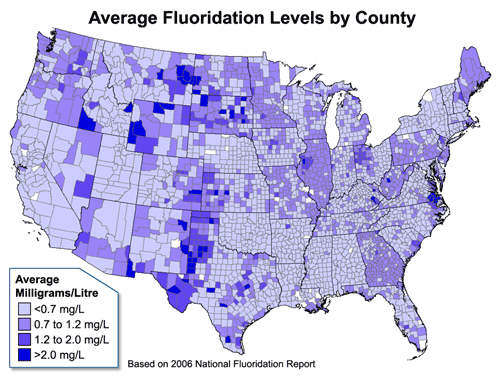Is Water Fluoridation Safe?

Fluoridating water is a public health intervention that started over 70 years ago. Since then, there has been a 25% reduction in cavities in children and adults. You might be aware of the tremendous amount of dental work your parents or grandparents may have had if they grew up without fluoride.
Water fluoridation is still a touchy topic, and the research surrounding it is constantly evolving.
There seems to be a big hullabaloo about fluoride every few years. The last one was in 2013, when Portland, Oregon voted against water fluoridation.

Opponents of fluoridation point to a review from Harvard which implies fluoride might be correlated with lower IQ levels in children in rural China. However, that review has been widely criticized for basing its findings on studies that didn’t control for other factors that impact IQ, such as parent education levels, socioeconomic status, and exposure to damaging pollutants, including lead. Furthermore, the communities studied in China didn’t have access to regulated water—in some places, water fluoride levels hit a whopping 30 mg/L, more than 15x what it should ideally be.
The Harvard study concludes that fluoride might have harmful effects at extremely high levels; however, this isn’t happening in developed countries where fluoride is carefully regulated.
Still, fluoride opponents continue to point to the Harvard review as evidence that fluoride is deadly. As usual, the reality is much more nuanced.

Opponents also point to the fact that many European countries don’t fluoridate their water. Looking at it closely, this is almost always because their citizens have access to fluoride through alternative means. In some places (e.g. Italy and Sweden), the water has ideal, naturally-occurring fluoride levels. In others (e.g. Germany and Switzerland), fluoride is added to table salt and milk. Thus, modern countries that don’t fluoridate their water are by-and-large still in favor of fluoridation—they just don’t need to do it through the water supply.
One key thing many people misunderstand about water fluoridation is that it involves regulating fluoride in the water. This includes keeping fluoride levels at low, safe levels. Fluoride is almost exclusively only a problem in places where water systems already have extremely high, naturally-occurring fluoride levels that aren’t regulated or controlled.

In the U.S., the EPA has mandated that fluoride levels not exceed the upper limit of 4mg/L, with the ideal upper limit of 2 mg/L. Thus, cities aim to maintain a lower fluoride level between 0.7 and 1.2 mg/L. You can check the fluoride levels where you live here, at the CDC’s website.

A recent CNN article titled, “Fluoride exposure in utero linked to lower IQ in kids, study says” again put some parents in a tailspin.
The paper it’s based on, published in Environmental Health Perspectives, looked at almost 300 mom/child pairs living in Mexico. Project authors analyzed pregnant mothers’ fluoride levels alongside scores of their children’s IQ performance throughout childhood. They concluded that higher fluoride levels in the mothers’ urine were correlated with lower IQ scores in their children.
What the article doesn’t clearly state is that these results don’t readily apply to women and children in the US because the fluoride we get through our water is well-regulated. Fluoride is not added to the water supply in Mexico, but people are exposed through unregulated amounts of naturally-occurring fluoride in water and fluoridated salt and supplements. But again, these amounts are unregulated and nobody knows how much they’re ingesting.
However, the study in Mexico does raise important questions about fluoride’s possible effects on babies in utero. No one has studied prenatal fluoride exposure before, and it looks like we have some more work to do in this area, especially in developing countries with vulnerable populations. Thus, these studies remind us that scientific questions are rarely closed cases.
At the end of the day, virtually all scientists come down in favor of regulated water fluoridation, but if you’re skeptical, that’s okay too. We should always keep studying and rethinking major public health interventions.
And fluoride’s no exception.
Back to:
Bibliography/Works Consulted
Bernstein, Lenny. “U.S. Updates Water Fluoridation Guideline for the First Time in 53 Years.” The Washington Post, April 27, 2015.
Blum, Deborah. “A Natural History of Fluoride.” Wired, May 23, 2013. https://www.wired.com/2013/05/a-natural-history-of-fluoride/.
Blumgart, Jake. “What’s the Matter With Portland?” Slate, May 17, 2013. https://www.slate.com/articles/health_and_science/medical_examiner/2013/05/portland_fluoride_vote_will_medical_science_trump_fear_and_doubt.html.
Dovey, Dana. “Children’s IQ May Be Affected by Fluoride in Drinking Water.” Newsweek, September 19, 2017. https://www.newsweek.com/childrens-iq-could-be-lowered-drinking-tap-water-while-pregnant-667660.
Gelinas, Julianna, and Myron Allukian. “Neurodevelopmental Toxicity: Still More Questions than Answers.” The Lancet Neurology 13, no. 7 (July 1, 2014): 647–48. doi:10.1016/S1474-4422(14)70119-X.
Glynn, Sarah. “Fluoride May Lower Your IQ.” Medical News Today, July 26, 2012. https://www.medicalnewstoday.com/articles/248275.php.
Hill, Kyle. “Why Portland Is Wrong About Water Fluoridation.” Scientific American Blog Network, May 22, 2013. https://blogs.scientificamerican.com/but-not-simpler/why-portland-is-wrong-about-water-fluoridation/.
Johnson, George. “Fluoride Paranoia and Betteridge’s Law.” Discover, February 15, 2013. https://www.wishpond.com/lp/2246844/reference.
Kliff, Sarah. “A Brief History of America’s Fluoride Wars.” Washington Post, May 21, 2013, sec. Wonkblog. https://www.washingtonpost.com/news/wonk/wp/2013/05/21/a-brief-history-of-americas-fluoride-wars/.
Kounang, Nadia. “Fluoride Exposure in Utero Linked to Lower IQ in Kids, Study Says,” September 21, 2017. https://www.cnn.com/2017/09/19/health/fluoride-iq-neurotoxin-study/index.html.
Moyer, Melinda Wenner. “Does Fluoride Make Your Kids Dumb?” Slate, February 11, 2013. https://www.slate.com/articles/double_x/the_kids/2013/02/does_fluoride_lower_your_child_s_iq_dr_joseph_mercola_says_yes_on_the_huffington.html.
Naldenko, Olga. “Fluoride Can Harm Children’s Intelligence, Mexican Study Finds.” Environmental Working Group, September 26, 2017. https://www.ewg.org/enviroblog/2017/09/fluoride-can-harm-children-s-intelligence-mexican-study-finds#.WcqGMdOGOqQ.
Novella, Steven. “NeuroLogica Blog » Anti-Fluoride Propaganda as News.” Accessed September 24, 2017. https://theness.com/neurologicablog/index.php/anti-fluoride-propaganda-as-news/.
Pearcey, Craig D. “The Fluoride Dragon Cometh! Or Does He?,” September 18, 2016. https://sciencebasedmedicine.org/the-fluoride-dragon-cometh-or-does-he/.
Read “Fluoride in Drinking Water: A Scientific Review of EPA’s Standards” at NAP.edu. Accessed September 23, 2017. doi:10.17226/11571.
Ritchey, Grant. “Cochrane Review on Community Water Fluoridation.” Science-Based Medicine, July 3, 2015. https://sciencebasedmedicine.org/cochrane-review-on-your-precious-bodily-fluids-community-water-fluoridation/.
Wylie, Ian. “Something in the Water: Is Fluoride Actually Good for Cities?” The Guardian, April 13, 2016, sec. Cities. https://www.theguardian.com/cities/2016/apr/13/is-fluoride-good-for-cities-newcastle-hull.
[…] Read also: Is Water Fluoridation Safe? […]